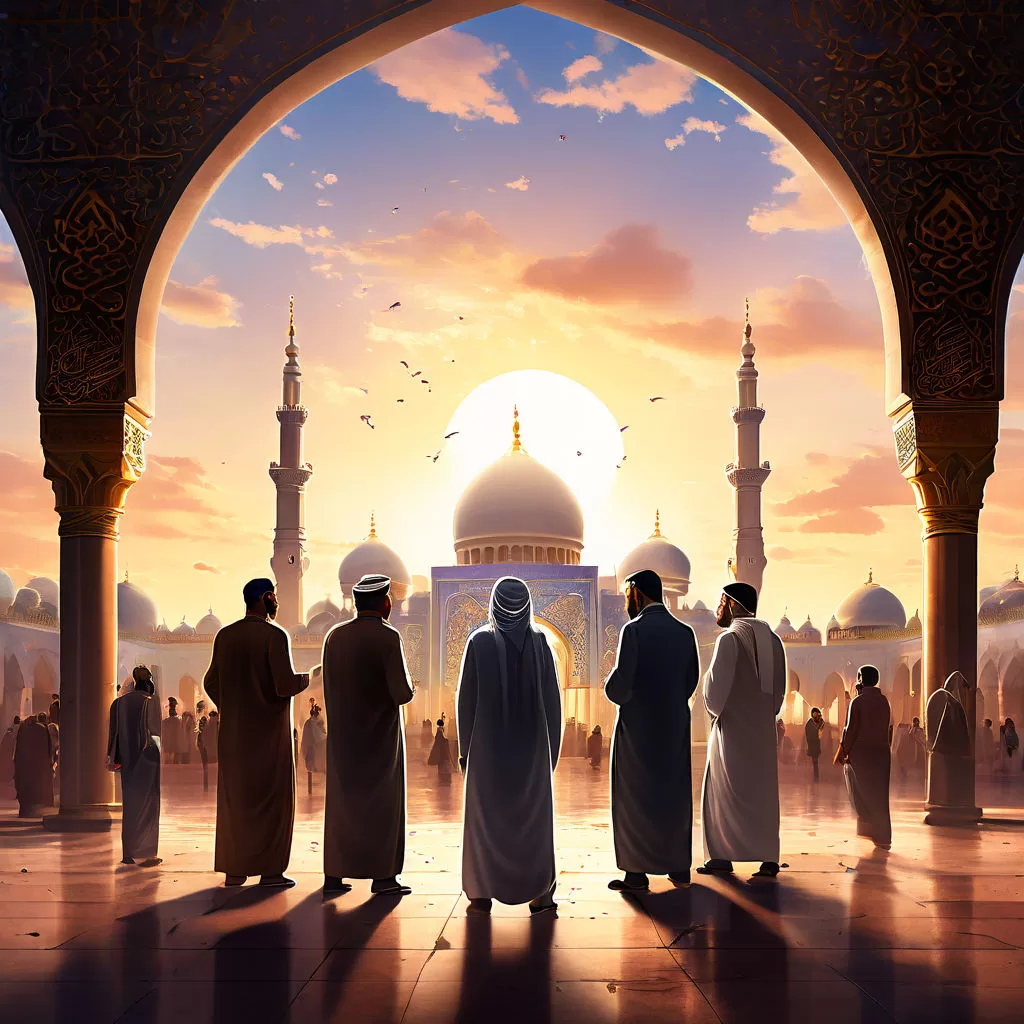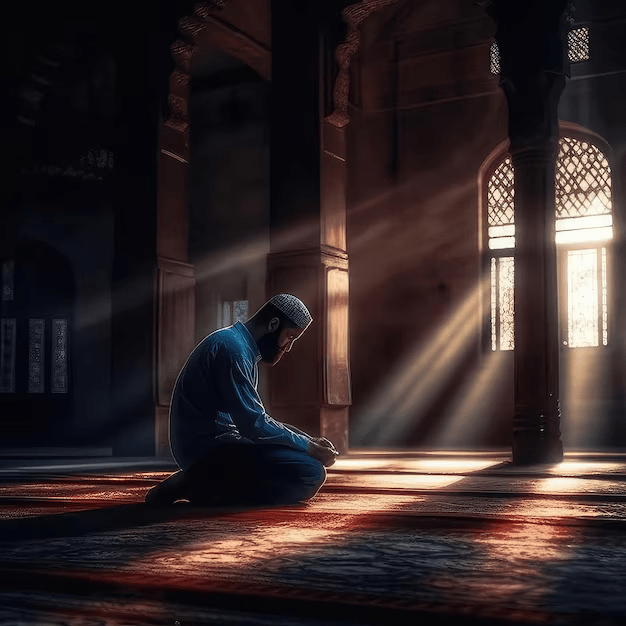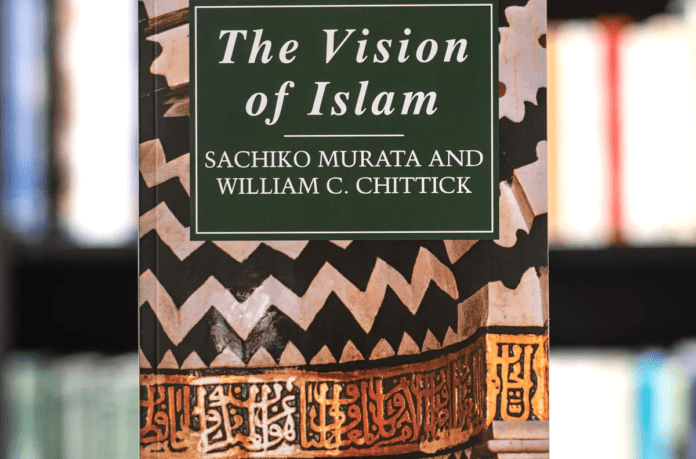The Vision of Islam – Extract-9
So tell the tale — perhaps they will reflect. [Koran 7:176]
God’s Mercy and Wrath
The names of acts are names whose opposites are also applied to God.[1] Many people, on hearing that God is called by opposite names, ask an obvious question: How can a single God have qualities that are contradictory? How can God be both merciful and wrathful? The simplest answer is that, as we have just explained, God is one, but he is dealing with many creatures. As the governing and controlling Lord of all creation, he interrelates with each creature in different ways. Moreover, with any given creature, the ways in which he interrelates change over time. God is Life-giver and Slayer, but he does not give life to a single creature and take it away at one and the same time under the same relationship. In other words, he gives someone life, sustains that life for a period of time, and then takes it away. He may be giving life to some people and taking it away from others at one and the same time.
Relationships become much more subtle as soon as we ponder the situation. Every birth—every giving of life—is also a death, a slaying. A child is born into the world, but dies from the womb. A person dies from this world, but is born into the next world. Life-giving and slaying are not so different after all. All the opposite qualities have subtle relationships that allow us to show that their opposition is not absolute. Rather, their opposition might better be called complementarity. As soon as we understand that the two opposite names are in fact two sides of the same coin, we come closer to tawhid, or to showing that unity underlies multiplicity. Because many of the divine names can be paired as opposites, they are often divided into two groups. The first group designates attractive and gentle attributes that instill a sense that it would be nice to be close to someone who possessed them. One might call these qualities motherly, since they are warm and embracing. They include such divine names as Merciful, Compassionate, Loving, Kind, Forgiving, and Beautiful. The second group of names is not so appealing, because they instill in those who think about them a sense of awe and fear. They include names such as Wrathful, Vengeful, Severe, Majestic, Just, Harmer, and Slayer. It is difficult to overestimate the importance of these two categories of names for Muslim thinking about tawhid. Because of the two different perspectives these names allow, Muslim discussion of God’s relationship to the world and its inhabitants frequently waffles between two standpoints. One standpoint considers God as distant and severe, the other as near and kind. A person’s first reaction may be, “Why don’t you make up your mind?”

The more you think about it, the more it should become clear that the most important questions cannot be answered “yes” or “no.” And in this case, we are dealing with the most important of all questions, that of the nature of reality itself. If we can usually say yes or no about everyday affairs that does not mean that we can always make categorical statements about the Real. Indeed, it would be nice if everything were simple and straightforward, with no complications. But life and existence are not simple and straightforward. People who think that they are, frequently do so by blocking out much of the world around them. Many forms of fundamentalism lead in this direction, but this is an approach quite alien to the Islamic intellectual tradition, which allows for subtleties and shifts of perspective.
Nearness and Distance
Tawhid can be looked at from two basic points of view. From the first point of view, tawhid means that everything real and good belongs to God. “There is nothing real but the Real.” “Praise belongs to God.” Everything other than God, by the fact of being other, is unreal, and hence it has nothing intrinsically good about it. From the second point of view, tawhid means that every trace of good and reality that can be found in ourselves and the world derives from God, the only true reality. From the first standpoint, God is real and the world is unreal. From the second standpoint, the world partakes of God’s reality to some degree.
These two standpoints or perspectives can be correlated with the divine names. If we think about the names of majesty, we can see that they affirm God’s reality and the world’s unreality. God is Majestic, Great, and Magnificent, while the world is small, paltry, and insignificant. Why? Because God is real and permanent, but compared to his reality, the world is like a vanishing shadow.
God is the King who has power over all things. He is the absolute Ruler. He is Independent of the worlds, since he has no need of anything in the cosmos. But the cosmos has every need for God, because he is the source of its existence. The name King does not make the point as strongly as it would have in pre-modern times, when there were still kings. A constitutional monarch is not a king, nor is a president or a dictator. A king in the ancient perspective—which is present in Islam and certainly implicit in the fact that God is called King—was this world’s absolute authority.
His word was a final command. Frequently, an executioner stood next to him with an ax, and it was enough for him to point his finger for one of his subjects to lose his head (literally). Sometimes, the king was veiled from his subjects, since no one was worthy of seeing his face save his intimates. To see his face without permission or by accident could be a death sentence.
Kings, in short, were powerful symbols for God’s sovereignty over the whole of existence. And it was characteristic of kings to be distant from ordinary people, to be awe inspiring and frightening. From one point of view, God is considered a powerful king worthy of such names as High, Mighty, Transcendent, Exalted, Holy, and Distant. In keeping with his distance and aloofness from creatures, the king often shows his wrath through terrible manifestations of power. He sends out his armies against all those who dare to lift their heads in protest against his commands, and his retribution is truly terrible. When people look at God in terms of these attributes of majesty and wrath, their natural reaction is to cringe and tremble.
If this were all the Koran had to say about God, Islam would be a terrifying religion, but God also has names of beauty and mercy. God is concerned for each and every one of his creatures. He is like a mother with many children who wants each one to have the best.

One day, the Prophet was traveling with some companions and they stopped at an encampment of bedouins. He asked who these people were, and he was told that they were Muslims. As they rested in the camp, a woman was baking bread in an oven carved in the ground. She carried an infant on her hip. Suddenly, as she was fanning the oven’s fire, its flames leapt up, and she jumped back quickly to protect her child. A few minutes later, the woman came to the Prophet and asked, “Are you God’s Messenger?” He replied that he was. She said, “Is it not true that God is the most merciful of the merciful?” He replied that it was true. She said, “A mother would not throw her child into the fire.” The Prophet looked at the ground and wept. After a few moments, he looked at her and said, “God will only chastise the one who is defiant and rebellious, the one who rebels against God and refuses to say, ‘There is no god but God.’”
In other words, the Prophet is saying that God will only chastise those who deny tawhid and insist on remaining distant from God’s mercy.
The Koran says, “Do not despair of God’s mercy. Verily God forgives all sins” (39:53).

This is the other side of the Koranic message. If God is a stern king, he is also a caring nurse. All the merciful and gentle names point to the reality of God’s concern: Loving, Compassionate, Forgiving, Pardoner, Overlooker, Life-giver. These are qualities that illustrate God’s nearness to his creatures, the fact that he never leaves them on their own. “We are nearer [to the human being] than his jugular vein” (50:16). “He is with you wherever you are” (57:4). “Wherever you turn, there is the face of God” (2:115). The natural human response to a God who is conceived in these terms is to feel close to him and to love him. One could say that God has two faces—a merciful face and a wrathful face, or a gentle face and a severe face, or a near face and a far face. People must fear the wrathful face and love the merciful face. But how should they express these feelings? Normally, if people fear something, they run away from it. But one can hardly hide from God, when his face is found wherever you turn. Hence, the Koran commands people, “Flee to God” (51:50). The Prophet used to pray, “I seek refuge in Thy good-pleasure from Thy anger, I seek refuge in Thy pardon from Thy punishment, I seek refuge in Thee from Thee.” When you fear God, you do not run away from him, you run toward him. And when you love God, you also run toward him. This is precisely the implication of tawhid. However you approach things, you are led back to God. It may be helpful to think of the two viewpoints of nearness and distance in terms of the relationship between unity and multiplicity, or oneness and many-ness. Tawhid affirms that God is one. Since God is infinitely beyond the universe, the universe can have no share in his oneness. Hence, the universe is divisible into an infinite number of parts. God is unity, while the world is multiplicity. From the second point of view, God’s unity is reflected within the universe. This means that the universe is a single whole, and that all its parts share in harmony, balance, and equilibrium.
To be continued ……
Book Reference:
Vision of Islam[2]
https://docs.google.com/document/d/e/2PACX-1vSR-k2LaYXnPssN_97lqfcjKVXXunvaIPQ-Y6pAFoM3ipnEHdSHCgbj6QTk7tReQZ95VR–F3yKjNwj/pub
[1] “The Vision of Islam” authored by Dr. Sachiko Murata and Dr. William C. Chittick delves into the multifaceted aspects of Islam, including practice, faith, spirituality (Ihsan), and the Islamic perspective on history, drawing from the teachings of the Hadith of Gabriel.
[2] Vision of Islam اردو ترجمہ مکمل کتاب http://www.williamcchittick.com/wp-content/uploads/2019/06/ Chittick-and-Murata-Vision-of-Islam-Urdu-Translation-by-Muhammad Suheyl Umar.pdf
https://salaamone.com/vision/





